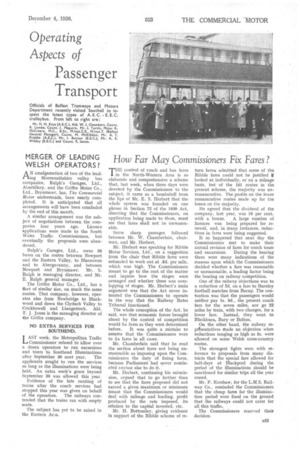How Far May Commissioners Fix Fares?
Page 55

If you've noticed an error in this article please click here to report it so we can fix it.
THE control of coach and bus fares in the North-Western Axes is so elaborate and comprehensive a scheme that, last week, when three days were devoted by the Commissioners to the subject, it came as a bombshell from the lips of Mr. E. S. Herbert that the whole system was founded on one phrase in Section 72 of the 1930 Act, directing that the Commissioners, on application being made to them, must see that fares shall not be unreasonable.
Some sharp passages followed between Mr. W. Chamberlain, chairman, and Mr. Herbert.
Mr. Herbert was speaking for Ribble Motor Services, Ltd„ on a suggestion from the chair that-Ribble fares were estimated to work out at .8d. per mile, which was high. The Commissioners meant to go to the root of the matter and inquire how the stages were arranged and whether there was overlapping of stages. Mr. Herbert's main argument was that the Act never intended the Commissioners to operate in the way that the Railway Rates Tribunal functioned.
The whole conception of the Act, he said, was that economic forces brought about by the control of competition would fix fares as they were determined before. It was quite a mistake to assume that the Commissioners were to fix fares in all cases.
Mr. Chamberlain said that he read the section about fares not being unreasonable as imposing upon the Commissioners the duty of fixing fares, because Parliament had never nominated anyone else to do it.
Mr. Herbert, continuing his submission, argued that to go farther than to see that the fares proposed did not exceed a given maximum or minimum meant that the Commissioners would deal with mileage and loading, profit produced by the rate imposed, its relation to the capital invested, etc.
Mr. H. Bottomley, giving evidence in support of the Ribble scheme of re
turn fame* admitted that some of the Ribble fares could not be justified If looked at individually, or on a mileage basis, but of the 161 routes in the present scheme, the majority was unremunerative. The profits on the fewer remunerative routes made up for the losses on the majority.
He agreed that the dividend of the company, last year, was 10 per cent.
with a bonus. A large number of licences was being prepared for renewal, and, in many instances, reductions in fares were being suggested.
It so happened that next day the Commissioners met to make their annual revision of fares for coach tours and excursions. During the hearing there were many indications of the reasons upon which the Commissioners decided whether a fare was reasonable or unreasonable, a leading factor being the bearing on railway competition.
One of the railway objections was to a reduction of 3d. on a fare to Burnley football matches from Bacup. The contention was that the passengers would neither pay. Is. 9d., the present coach fare for the seven miles, nor go 22 miles by train, with two changes, for a lower fare. Instead, they went to Blackburn, Bury or Bolton.
On the other hand, the railway reprtsentatives made no objection when reductions ranging as high as Ss. were allowed on some Welsh cross-country routes.
The strongest fights were with reference to proposals from many districts that the special fare allowed for half-days at Blackpool during the period of the illuminations should be sanctioned for similar trips all the year round.
Mr. P. Kershaw, for the L.M.S. Railway Co., reminded the Commissioners that the cheap fares for the illumination period were fixed on the ground that the railways could not cater for all this traffic.
The Commissioners reserved their decision.




























































































